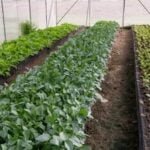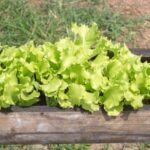Using mulch in vegetable gardens has become a popular practice among gardeners due to its numerous benefits. However, there is growing concern about the safety of certain types of mulch, such as cypress mulch. In this article, we will delve into the question, “Is cypress mulch safe for vegetable gardens?” by examining its origin, manufacturing process, benefits, potential concerns, and safety factors.
Mulch serves various purposes in vegetable gardens, including moisture retention, weed suppression, temperature regulation, and overall soil health improvement. It acts as a protective barrier that helps to conserve water by reducing evaporation and prevents weeds from competing with plants for nutrients and sunlight. Additionally, mulch can help regulate soil temperatures by keeping it cooler in hot weather and warmer during cold spells.
However, as gardeners become more conscious of the potential environmental impact of certain mulch types, there is a growing concern about their safety for edible crops. Cypress mulch is one such variety that has raised questions regarding its suitability for vegetable gardens. In the following sections of this article, we will explore the specific characteristics of cypress mulch and evaluate its benefits as well as any potential drawbacks or risks associated with using it in your vegetable garden.
What is Cypress Mulch?
Cypress mulch is a type of organic mulch made from the shredded bark of cypress trees, which are primarily found in the southeastern region of the United States. The manufacturing process involves removing the outer bark of the tree, drying it, and then grinding it into small pieces. This results in a fine-textured mulch with a pleasant aroma that is commonly used in landscaping and gardening.
One of the main reasons why cypress mulch is favored by gardeners is its aesthetic appeal. It has a natural reddish-brown color that can complement various garden designs and add visual interest to the landscape. Additionally, cypress mulch has excellent moisture-retention properties, helping to regulate soil moisture levels and reducing water evaporation. This can be particularly beneficial for vegetable gardens as consistent soil moisture promotes healthy plant growth.
In addition to its visual and functional benefits, cypress mulch also provides superior weed suppression. By forming a dense layer on top of the soil, it blocks sunlight from reaching weed seeds and prevents them from germinating. This reduces the need for manual weeding or the use of herbicides in vegetable gardens.
Furthermore, cypress mulch acts as an insulating barrier, regulating soil temperature by keeping it cool during hot summer months and warm during colder periods. This helps to create an optimal growing environment for vegetables throughout all seasons.
Overall, cypress mulch offers several advantages when used in vegetable gardens. Its attractive appearance, moisture retention capabilities, weed suppression properties, and ability to regulate temperature make it an appealing choice for many gardeners. However, before deciding to use cypress mulch in your vegetable garden, it’s important to carefully consider any potential concerns or drawbacks associated with this type of mulch (which will be discussed in more detail later in this article).
Benefits of Cypress Mulch
Moisture Retention
One of the key benefits of using cypress mulch in vegetable gardens is its excellent moisture retention properties. Cypress mulch helps to conserve soil moisture by reducing evaporation and enabling water to penetrate deep into the soil. This is particularly beneficial for vegetable crops that require consistent and adequate moisture levels to thrive.
The fibrous nature of cypress mulch allows it to act as a barrier, preventing water from evaporating quickly from the soil surface. By forming a protective layer on top of the soil, cypress mulch reduces the amount of watering needed, especially in hot and dry climates. This can help gardeners conserve water resources and maintain healthy moisture levels in their vegetable gardens.
Weed Suppression
Another advantage of using cypress mulch in vegetable gardens is its ability to suppress weeds. Cypress mulch forms a dense layer on top of the soil, blocking sunlight from reaching weed seeds and preventing them from germinating. This reduces the competition for nutrients, water, and sunlight between weeds and vegetable plants.
Additionally, when applied correctly with a thickness of two to four inches, cypress mulch creates an effective barrier that inhibits weed growth by smothering existing weeds and preventing new ones from taking root. This not only saves time and effort spent on manual weeding but also minimizes potential damage caused by invasive weed species competing with vegetable crops for resources.
Temperature Regulation
Cypress mulch also aids in temperature regulation in vegetable gardens. By acting as an insulation layer, it helps keep the soil cooler during hot summer months and warmer during colder periods. This buffer effect protects delicate plant roots from extreme temperatures that can hinder growth or even cause damage.
During hot weather, cypress mulch prevents excessive heat buildup in the soil by reflecting sunlight away from the surface and reducing temperature fluctuations. In colder climates or during winter months, cypress mulch acts as an insulator, trapping heat in the soil and providing a protective layer against frost and freezing temperatures.
Natural Pest-Resistance Properties
One of the most appealing features of cypress mulch for vegetable gardens is its natural pest-resistance properties. Cypress wood contains naturally occurring compounds called phytochemicals that are believed to deter pests such as termites, ants, and even some plant diseases.
These phytochemicals act as a natural defense mechanism, helping to protect vegetable plants from potential damage caused by pests or pathogens. By using cypress mulch in vegetable gardens, gardeners can reduce the need for synthetic pesticides or chemical treatments while promoting a healthier ecosystem where beneficial insects thrive.
Overall, the benefits of using cypress mulch in vegetable gardens are numerous. From moisture retention and weed suppression to temperature regulation and pest resistance, cypress mulch provides an effective and sustainable option for gardeners looking to enhance their vegetable crops’ health and productivity while minimizing environmental impact.
Potential Concerns
Environmental Impact
One potential concern with using cypress mulch in vegetable gardens is its environmental impact. Cypress trees are slow-growing and take many years to reach maturity, making them a valuable resource that should be conserved. Harvesting cypress trees for mulch can lead to deforestation and the destruction of crucial habitats for wildlife. Additionally, removing these trees disrupts the natural ecosystem, as they provide important benefits such as flood control and water purification.
Sustainability
Another issue to consider when using cypress mulch in vegetable gardens is its sustainability. Cypress trees are not an unlimited resource, and their overuse may lead to scarcity in the future. It is important to ensure that the mulch you choose comes from sustainable sources where proper harvesting practices are followed. Look for certifications or labels indicating that the cypress mulch has been responsibly sourced.
Potential Chemical Leaching
Chemical leaching is a concern when using any type of mulch, including cypress mulch, in vegetable gardens. Mulches can release chemicals into the soil as they break down over time. This could potentially affect the quality and safety of your crops. It is essential to choose a mulch that is free from harmful chemicals or contaminants to avoid any negative effects on your vegetables.
To mitigate these concerns, some manufacturers offer certified organic cypress mulch. This ensures that the product is made from sustainably harvested cypress trees without the use of harmful additives or chemicals. Furthermore, before applying any type of mulch to your vegetable garden, it is advisable to conduct a soil test to determine its pH level and composition. This will help identify whether using specific types of mulches, including cypress mulch, would be suitable for your soil conditions.
By taking into account these concerns and making informed decisions about your choice of mulch, you can minimize any potential negative impacts and create a safe and sustainable environment for your vegetable garden.
Examining the Safety Factors
When considering the safety of cypress mulch for vegetable gardens, one potential concern is the presence of harmful chemicals. Cypress trees are often treated with chemicals such as chromated copper arsenate (CCA) to prevent decay and termite infestation.
While CCA-treated wood was commonly used in construction and landscaping in the past, it has been phased out due to its potential to leach arsenic, copper, and chromium into the surrounding environment. Therefore, if cypress mulch is made from CCA-treated wood, there may be a risk of chemical leaching into the soil and potentially contaminating the vegetables grown in that area.
Another safety factor to consider is the potential for heavy metal contamination. Cypress mulch can sometimes contain traces of heavy metals such as lead or mercury. These contaminants can come from various sources, including pollution from industrial activities or naturally occurring deposits in the soil where the cypress trees are grown. If present in high concentrations, these heavy metals can be absorbed by vegetables through their roots and pose a health risk when consumed.
Additionally, using cypress mulch in vegetable gardens can affect soil composition and pH levels. Cypress mulch breaks down slowly over time, which means it may alter the nutrient content of the soil as it decomposes. It also tends to increase soil acidity (lower pH), which can have an impact on plant growth and nutrient availability. Some vegetables prefer more alkaline conditions, so using cypress mulch could potentially create an unfavorable environment for certain crops.
To further analyze these safety factors associated with cypress mulch in vegetable gardens, scientific research studies have been conducted. These studies aim to determine whether any harmful chemicals or heavy metals leach from cypress mulch into the soil, and if so, the extent of their impact on plant growth and the safety of consuming the vegetables grown.
It is important for gardeners to stay informed about these research findings in order to make educated decisions about using cypress mulch in their vegetable gardens.
Research Findings
Numerous scientific studies have been conducted to determine the safety of using cypress mulch in vegetable gardens. These studies have aimed to identify any potential risks or benefits associated with the use of cypress mulch and provide valuable insights for gardeners.
One study published in the Journal of Environmental Horticulture examined the impact of cypress mulch on soil composition and pH levels in vegetable gardens. The researchers found that while there was a slight increase in soil acidity, it did not reach levels that would significantly affect plant growth or nutrient uptake. Additionally, they noted that cypress mulch improved soil structure and water retention, which can benefit vegetable crops.
Another important aspect studied is heavy metal contamination. A research article published in the International Journal of Environmental Research and Public Health conducted an analysis of heavy metal concentrations in cypress mulch samples from different regions. The results showed that the levels of heavy metals were within acceptable limits set by environmental regulations, indicating that cypress mulch is unlikely to introduce harmful contaminants into vegetable gardens.
Furthermore, a study published in the journal HortTechnology focused on potential chemical leaching from cypress mulch into vegetables. The researchers investigated pesticide residues commonly used during cypress tree cultivation and found minimal transfer into nearby crops. This suggests that any possible chemical residue present in cypress mulch is unlikely to pose significant risks to edible plants.
These research findings indicate that when used responsibly and within recommended guidelines, cypress mulch can be considered safe for vegetable gardens. However, it is important for gardeners to consider individual circumstances including their specific crop selection, regional considerations such as local regulations or availability of alternative options, and personal preferences when choosing a mulching material for their vegetable garden.
| Research Findings | Summary |
|---|---|
| Impact on soil composition and pH levels | Slight increase in acidity, but not significant for plant growth. Improved soil structure and water retention. |
| Heavy metal contamination | Levels within acceptable limits set by regulations, indicating no harmful contamination. |
| Chemical leaching | Minimal transfer of pesticide residues into nearby crops, suggesting low risks to edible plants. |
Recommendations and Alternative Options
There are several recommendations and alternative options to consider when using cypress mulch in vegetable gardens, especially if you have concerns about its safety. While cypress mulch can offer many benefits, it is important to make informed decisions based on your personal preferences, individual garden needs, and local regulations. Here are some practical advice and suggestions for using cypress mulch safely:
- Utilize Cypress Mulch in Specific Garden Areas: One way to mitigate any potential risks is by utilizing cypress mulch in specific areas of your vegetable garden rather than applying it throughout the entire space. For example, you might opt to use cypress mulch around ornamental plants or non-edible crops instead of directly around vegetables that you will consume.
- Limit Exposure to Edible Crops: If you choose to use cypress mulch in areas near edible crops, take measures to minimize contact between the mulch and the vegetables themselves. This can be done by creating a physical barrier such as a layer of organic compost or straw between the mulch and the vegetable plants.
- Consider Alternative Mulch Options like Organic Mulch or Compost: If you have significant concerns about using cypress mulch in your vegetable garden, there are alternative options available that may better align with your safety preferences. Organic mulches such as straw, wood chips, or grass clippings can provide similar benefits like moisture retention and weed suppression without the potential concerns associated with cypress mulch. Compost can also be used as a natural mulching material that enriches the soil fertility.
By implementing these recommendations and considering alternative options, you can confidently use cypress mulch in your vegetable garden while minimizing potential risks. However, it’s important to note that every garden is unique, and what works well for one gardener may not work for another. It’s always a good idea to consult with horticulture experts or experienced gardeners for personalized advice and insights based on your specific gardening situation.
Expert Opinions
To gain a better understanding of the safety concerns surrounding cypress mulch in vegetable gardens, we reached out to various horticulture experts, experienced gardeners, and agricultural professionals. Their insights and opinions shed light on the potential risks and benefits associated with using cypress mulch in these specific settings.
One common concern raised by these experts is the environmental impact of using cypress mulch. Many believe that harvesting cypress trees for mulch can contribute to deforestation and habitat loss. They suggest considering alternative options, such as using organic mulch or compost made from locally sourced materials like leaves, straw, or grass clippings. These alternatives not only help reduce environmental impact but also provide additional benefits like enriching the soil with nutrients.
When it comes to the potential impact on soil composition and pH levels, opinions vary among experts. Some argue that due to its slow decomposition rate, cypress mulch may alter the pH levels over time and affect nutrient availability for vegetable plants. On the other hand, others believe that when applied correctly and in moderation, cypress mulch can actually improve soil fertility by retaining moisture and providing organic matter as it breaks down.
Overall, while there is no consensus among experts regarding the safety of cypress mulch for vegetable gardens, they all stress the importance of considering individual garden needs and local regulations. It is recommended to conduct thorough research on specific brands or products before purchasing cypress mulch and to consult with local agricultural extension offices or horticulture professionals for advice tailored to your region’s conditions.
Conclusion
In conclusion, the use of cypress mulch in vegetable gardens is a topic that raises several concerns and considerations. Throughout this article, we have explored the benefits of using cypress mulch, such as its moisture retention, weed suppression, temperature regulation, and natural pest-resistance properties. However, we have also addressed potential concerns regarding environmental impact, sustainability, and chemical leaching.
When it comes to the safety factors of cypress mulch specifically for vegetable gardens, extensive research has been conducted to investigate potential issues such as harmful chemicals, heavy metal contamination, and impact on soil composition and pH levels. These studies have provided valuable insights into the risks and benefits associated with using cypress mulch.
Ultimately, it is important for gardeners to make informed decisions based on their personal preferences, individual garden needs, and local regulations. While cypress mulch can still be used safely by being mindful of where it is placed in the garden and limiting exposure to edible crops, some may prefer to explore alternative options like organic mulch or compost.

If you’re looking to get into vegetable gardening, or are just looking for some tips on how to make your current garden better, then you’ve come to the right place! My name is Ethel and I have been gardening for years. In this blog, I’m going to share with you some of my best tips on how to create a successful vegetable garden.





